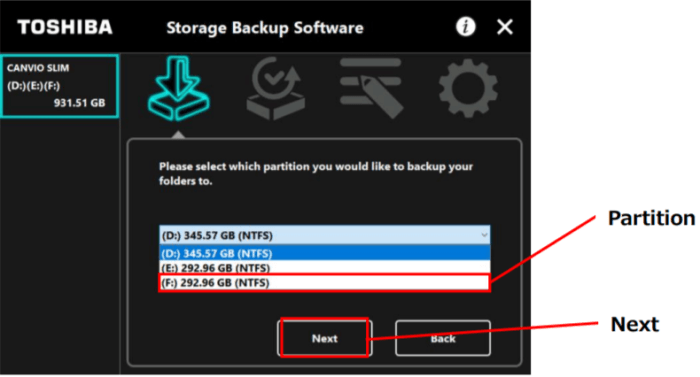In today’s digitally driven world, data security is paramount. Protecting sensitive information stored on your hard drive is crucial, and hard disc encryption software offers a robust solution. This comprehensive guide explores the intricacies of hard drive encryption, examining various software options, their features, security protocols, and considerations for choosing the right solution for your needs. We’ll delve into topics such as full disk encryption (FDE), self-encrypting drives (SEDs), and the importance of strong passwords and key management.

Source: ubackup.com
Understanding Hard Disc Encryption
Hard disc encryption is a process that transforms your readable data into an unreadable format, known as ciphertext, using a cryptographic algorithm. This scrambled data is only accessible with a decryption key, ensuring that unauthorized individuals cannot access your sensitive files, even if your hard drive is stolen or compromised. The strength of the encryption depends on the algorithm used and the length of the encryption key.
Common algorithms include AES (Advanced Encryption Standard) – often with 256-bit keys – and others such as Twofish and Serpent.
Types of Hard Disc Encryption
- Full Disk Encryption (FDE): This encrypts the entire hard drive, including the operating system, applications, and user data. It provides the highest level of protection, as all data is secured, regardless of the file type or location.
- File-Level Encryption: This encrypts individual files or folders, allowing you to selectively protect specific data. While offering less comprehensive protection than FDE, it’s useful for encrypting sensitive documents or personal information within a larger, unencrypted system.
- Self-Encrypting Drives (SEDs): These are hard drives with built-in encryption capabilities. The encryption and decryption processes happen at the hardware level, offering a faster and more secure solution than software-based encryption. They often use AES encryption with various key lengths.
Popular Hard Disc Encryption Software
Numerous software solutions provide hard disc encryption capabilities. The best choice depends on your operating system, budget, and security requirements. Some popular options include:
Windows Encryption Software:
- BitLocker (Windows): Built-in to Windows Pro and Enterprise editions, BitLocker offers robust FDE capabilities. It supports various authentication methods, including PINs, passwords, and smart cards.
- VeraCrypt: A free, open-source alternative to BitLocker, VeraCrypt provides FDE and file container encryption. It’s known for its strong security and cross-platform compatibility.
- Microsoft Azure Information Protection (AIP): A cloud-based solution that offers file-level encryption and data loss prevention (DLP) capabilities. It’s particularly useful for managing encryption across multiple devices and platforms.
macOS Encryption Software:, Hard disc encryption software
- FileVault (macOS): Apple’s built-in FDE solution for macOS. It’s easy to use and provides a strong level of protection.
Linux Encryption Software:
- LUKS (Linux Unified Key Setup): A standard for disk encryption on Linux systems. It provides a flexible and secure framework for managing encryption keys.
- dm-crypt: A kernel-level encryption module that works with LUKS to provide FDE for Linux systems.
Choosing the Right Encryption Software
Selecting the appropriate hard disc encryption software requires careful consideration of several factors:
- Operating System Compatibility: Ensure the software is compatible with your operating system (Windows, macOS, Linux).
- Encryption Algorithm and Key Length: Opt for software using strong encryption algorithms like AES-256.
- Ease of Use: Choose software with a user-friendly interface, especially if you’re not technically inclined.
- Performance Impact: While encryption adds a layer of security, it can slightly impact system performance. Consider this trade-off.
- Key Management: Understand how the software manages encryption keys. A robust key management system is crucial for data recovery and security.
- Cost: Evaluate the cost of the software and weigh it against the value of protecting your data.
Security Best Practices: Hard Disc Encryption Software
Even with robust encryption software, maintaining strong security practices is essential:
- Strong Passwords: Use long, complex passwords that are difficult to guess. Consider using a password manager.
- Regular Updates: Keep your encryption software updated to benefit from the latest security patches and bug fixes.
- Secure Key Management: Protect your encryption keys carefully. Avoid storing them in easily accessible locations.
- Physical Security: Protect your computer from physical theft or unauthorized access.
- Data Backup: Regularly back up your encrypted data to a separate location. This ensures data recovery even if your hard drive fails.
Frequently Asked Questions (FAQ)
- Q: Is hard disc encryption necessary? A: The necessity of hard disc encryption depends on the sensitivity of your data. If you store confidential financial information, personal health records, or other sensitive data, encryption is highly recommended.
- Q: How does hard disc encryption affect performance? A: Encryption adds a small performance overhead, but advancements in algorithms and hardware have minimized this impact. The performance difference is often negligible for most users.
- Q: What happens if I forget my encryption key? A: Losing your encryption key means you will lose access to your data. Therefore, securely storing your key is critical. Some software offers key recovery options, but this should be carefully considered.
- Q: Can I encrypt a single folder or file instead of the entire drive? A: Yes, file-level encryption is possible, but it offers less comprehensive protection than full disk encryption.
- Q: Is self-encrypting drive (SED) better than software encryption? A: SEDs offer hardware-level encryption, which is generally faster and more secure than software-based encryption. However, software encryption is often more flexible and accessible.
Conclusion
Hard disc encryption is a vital aspect of data security. By understanding the different types of encryption, available software options, and security best practices, you can effectively protect your valuable data from unauthorized access. Choosing the right software and implementing strong security measures will significantly reduce the risk of data breaches and ensure the confidentiality of your information.
Call to Action
Protect your valuable data today! Explore the hard disc encryption software options discussed in this guide and choose the solution that best suits your needs and security requirements. Don’t wait until it’s too late – take control of your data security now.
Top FAQs
What are the different types of hard disc encryption?

Source: straight.com
Common types include full-disk encryption (encrypting the entire drive), file-level encryption (encrypting individual files), and partition-level encryption (encrypting specific partitions).
Is hard disc encryption slow?
While encryption does add a slight overhead, modern hardware and software minimize performance impact. The speed difference is usually negligible for most users.
What happens if I lose my encryption key?
Losing your encryption key means you will likely lose access to your encrypted data. It’s crucial to securely store your key and consider creating backups.
Can I encrypt an external hard drive?
Yes, many hard disc encryption software programs support encrypting external drives as well as internal ones.
Is hard disc encryption enough to protect my data?
Hard disc encryption is a crucial layer of security, but it should be combined with other security measures like strong passwords, regular software updates, and a robust security awareness.
